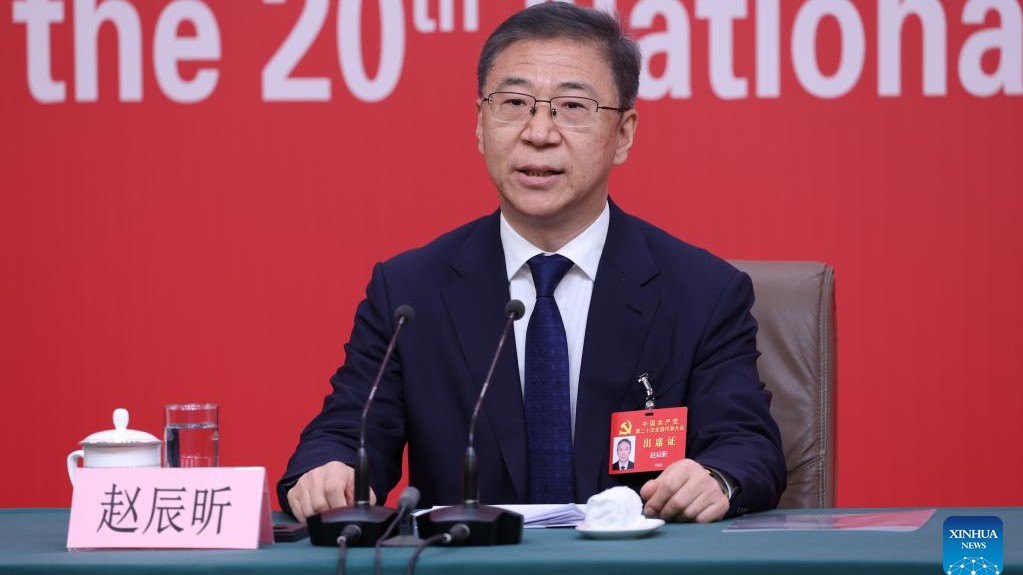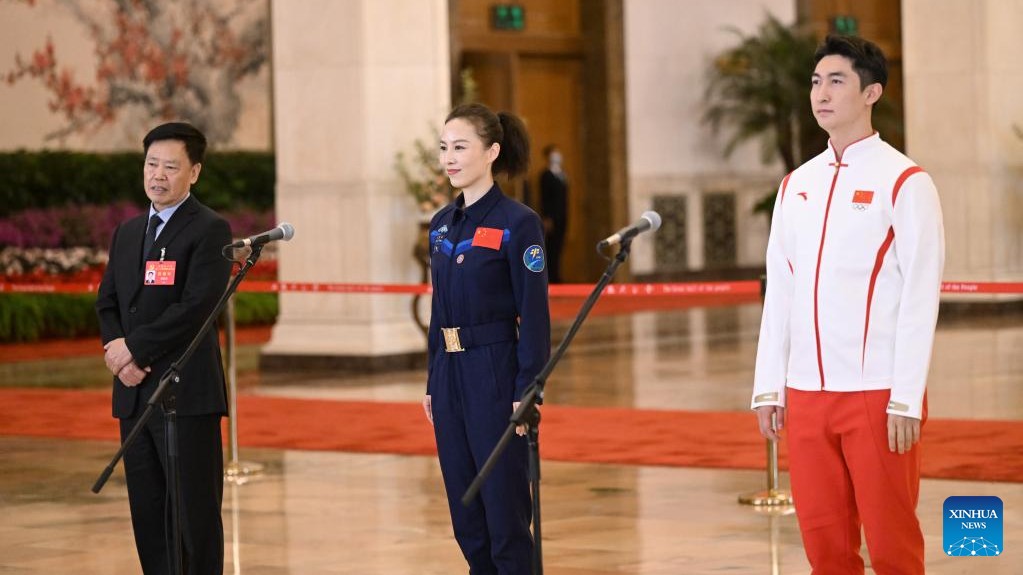
Photo taken on July 17, 2020 shows the 11th Press Conference on Xinjiang-Concerned Issues in Urumqi,Xinjiang.(Xinjiang Daily/Zhou Peng)
On July 17, 2020, the Information Office of the People's Government of Xinjiang Uygur Autonomous Region held the 11th press conference on Xinjiang related issues. The press conference invited the Spokesperson of the Information Office of the People’s Government of XUAR Elijan Anayit, the Director of the Ethnic Affairs Commission of XUAR Mehmut Usman, the Deputy Director of the Public Security Department of XUAR Yalkun Yakufu.
Host of press conference: Liu Wei
Liu Wei: Dear friends from the press, good afternoon. Welcome to the 11th press conference on Xinjiang related issues.
The invitees of today's press conference are the Spokesperson of the Information Office of the People’s Government of XUAR Elijan Anayit, the Director of the Ethnic Affairs Commission of XUAR Mehmut Usman, the Deputy Director of the Public Security Department of XUAR Yalkun Yakufu.They will answer questions from you.
Our friends from the press, please raise your hands to ask questions. Before asking questions, please introduce the name of the news press you are in.
Reporter from Xinjiang Station of China National Radio
Q1: Not long ago, the U.S. Department of State submitted the 2019 International Religious Freedom Report to the Congress, which alleges Xinjiang represses "religious freedom," "deprive ethnic minorities of their right to religious belief," "put a ban on Muslims from Ramadan fasting." Are these allegations real?
Liu Wei: This question goes to Elijan Anayit.
A: The allegations carried in the 2019 International Religious Freedom Report are totally groundless fakeries and rumors. Its real intention is to politicize religious issues, using religion to have a hand in Xinjiang's affairs and interfere with China's internal affairs.
Respect for and protection of freedom of religious belief is a long-term basic national policy of the government. It demonstrate the government's commitment to safeguarding people's rights and respecting and protecting human rights. The Constitution of the People's Republic of China clearly stipulates: "Citizens of the People's Republic of China enjoy freedom of religious belief." "No state organ, public organization or individual may compel citizens to believe in, or not believe in, any religion; nor may they discriminate against citizens who believe in, or not believe in, any religion." ""The state protects normal religious activities. No one may make use of religion to engage in activities that disrupt public order, impair the health of citizens or interfere with the educational system of the state." The Regulation on Religious Affairs promulgated by the State Council of the People's Republic of China and the Regulation of Xinjiang Uygur Autonomous Region on Religious Affairs promulgated by the local government of Xinjiang both reflect the above principles of the Constitution that "citizens enjoy freedom of religious belief" and that "the state protects normal religious activities." In Xinjiang. It is completely independent choice of citizens to believe in, or not believe in, any religion. No organization or individual may compel citizens to believe in, or not believe in, any religion; nor may they discriminate against citizens who believe in, or not believe in, any religion. The law protects normal religious activities. All normal religious activities, including attending religious services, fasting, worshipping Buddha, praying, preaching, reciting scriptures, burning incense, attending Mass, being baptized or ordained, observing extreme unction, holding memorial ceremonies, and celebrating religious festivals, that believers conduct at venues for religious activities or in their own homes in accordance with customary religious practices, are exclusive affairs of religious groups and the believers themselves. These activities are protected by law, and no organization or individual may interfere with them. Otherwise they shall bear the corresponding legal liability. Today, the freedom of religious belief in Xinjiang cannot be matched by that in any other historical period, and is undeniable to anyone who respect the facts. Xinjiang's commitment to respect and protect the policy of freedom of religious belief has received positive comments from the international community including Muslim countries. At its 46th session, the Council of Foreign Ministers of the Organization of Islamic Cooperation adopted a resolution commending China's efforts in providing care to its Muslim citizens.
In stark contrast, American policies’ intolerance towards Islamic world continue to deteriorate, and its “Muslim ban” policy has shocked the international community. In 2016, the former national security adviser Micheal Flnn, called Islamism a “vicious cancer inside the body of 1.7 billion people” that has to be “excised”. During the 2018 midterm elections, “More than a third have claimed that Muslims are inherently violent or pose an imminent threat,” and “Just under a third of the candidates considered have called for Muslims to be denied basic rights or declared that Islam is not a religion.” According to the research from Pew Research Center, 82% of the interviewees say that Muslims are subject to at least some discrimination. Thus, it is evident to the international community who does better and who does worse in protecting Muslims basic rights.
Reporter from Xinjiang Daily
Q2:The 2019 International Religious Freedom Report of U.S. Department of State questioned Xinjiang’s religious policies, alleging that Xinjiang puts high pressure on Muslims. What do you respond to that?
Liu Wei: This question goes to Mehmut Usman.
A:Xinjiang administers religious affairs in accordance with law, and has promulgated and revised the Provisional Regulations of the Xinjiang Uygur Autonomous Region on the Administration Sites for Religious Activities, the Provisional Regulations of the Xinjiang Uygur Autonomous Region on the Administration of Religious Activities, the Provisional Regulations of the Xinjiang Uygur Autonomous Region on the Administration of Religious Personnel and the Regulations of the Regulations of Xinjiang Uygur Autonomous Region on Religious Affairs. These local regulations specify the rights and interests of religious groups, religious staff, and venues for religious activities, providing legal guarantees for religious activities. For instance, the establishment of religious groups should be approved by governments above the county level and registered in the same level of mass organization registration authorities. No organization or individual is allowed to interfere in law-based religious activities or duties in religious groups. For instance, venues for religious activities should have to go through government registration formalities according to law before they get legal status. Legitimate status would be granted after registration. The venues enjoy the right to establish democratic management organization, manage their internal affairs, organize and conduct religious activities, receive donations, manage and use property, and initiate public welfare programs. For instance, clerical personnel in Xinjiang enjoy the right to preside over religious activities and ceremonies, and may receive social and individual donations. No organization or individual other than a religious group is allowed to appoint, designate, employ, dismiss or replace religious personnel.
In addition to law-based management in religious affairs, Xinjiang attaches great importance to service support. Governments in Xinjiang actively solve practical difficulties for religious communities, improve conditions of religions venues and for religious activities and eliminate security loopholes in venues for religious activities. Due to strengthened care and concern for religious personnel, all of them are covered in the social security system. During Ramadan this year, government provided facial masks and sanitizers to mosque goers free of charge.
Xinjiang severely punished crimes under the disguise of religion in accordance with the law. Xinjiang forbids any organization or individual from using religion to split the country, spread religious extremism, incite ethnic hatred, undermine ethnic unity, disturb social order, harm citizens’ physical or mental health, hinder the implementation of the country’s administrative, judicial, educational and cultural systems, or harm national security, national interests, public interests and civil rights and interests.
It is noted that like many countries in the world, China separates religion from government. No religion has the right to be above the Constitution and the law. Religious affairs and activities concerning national interests and social and public interests must be brought under the law. There is no doubt about it at all and we will unswervingly adhere to it.
Reporter from China News Service
Q3:The US State Department rebuked Xinjiang in its 2019 Report on International Religious Freedom, alleging that “Uygur families are forced to eat pork in Xinjiang, violating the Muslim principle”, “Uygurs are prohibited for holding traditional funerals” and “The Sulitan cemetery in Hotan and the cemetery of Tazhong road in Aksu have been destroyed”. Are they the truths?
Liu Wei: This question goes to Elijan Anayit.
A:The Constitution of the People’s Republic of China and the Law on Regional Ethnic Autonomy both prescribe that all ethnic groups have the freedom to maintain or reform their customs and habits. Xinjiang strictly follows the constitutional and legal provisions and fully protects the dietary, celebration, wedding and funeral rituals, and other customs of all ethnic groups.
In order to ensure the special food supply for ethnic minorities, especially that for Muslim minorities, we have taken a series of measures, such as requiring all big and medium sized cities as well as small towns where there are Muslim population to maintain certain numbers of Muslim restaurants, building Muslim canteens or restaurants on main roads and in organizations that have ethnic minority employees, supplying Muslim people with beef and lamb that are butchered and processed according to Muslim habits, and stored, transported and sold separately. I challenge those American politicians to name anyone who ever forced a Muslim or a Muslim family to eat pork? Stop lying through your teeth. The government has no restrictions on ethnic customs of wedding and funeral ceremonies and giving Islamic names. Among ethnic minorities who have the habit of burial, the government does not promote cremation, instead it takes specific measures to protect their habit, such as allocating special land for cemeteries. As for the so called “The Sulitan cemetery in Hotan and the cemetery of Tazhong road in Aksu have been destroyed”, it totally calls white black. The cemeteries were not destroyed, but rather well protected.
Reporter from Tianshannet
Q4:According to the 2019 Report on International Religious Freedom of the U.S. State Department, Xinjiang is dismantling mosques. The Mosque of Yecheng County, Kashgar Prefecture, the 800-year-old Id Kah Mosque in Hotan Prefecture and some other mosques in Xinjiang were destroyed on a large scale. Is it true?
Liu Wei: This question goes to Mehmut Usman.
A: The so-called “forced demolition of mosques” in Xinjiang is totally nonsense. As long as the venues for religious activities are registered with the government in accordance with the law, they will obtain legal status, and all their rights and interests will be protected by law. Xinjiang has always attached great importance to the protection and repair of mosques, and the governments at all levels in Xinjiang have not only helped and supported the improvement of mosques, but also guaranteed the normal religious needs of religious believers. Some mosques in Xinjiang were built in the 1980s-1990s and even before that with shabby facilities and potential safety hazards. With the development of urbanization and new rural construction, combining renovation project of urban run-down areas with the construction campaign of beautiful village, the governments at all levels in Xinjiang have renovated and adjusted the overall layouts of those small and dilapidated adobe houses and dangerous mosques in long disrepair in response to the demands oflocal religious personnel and believers. Through new construction, building on the original site of demolition, and expansion measures according to urban-rural construction planning, we have improved the conditions of the mosques and met the needs of the religious believers, which is widely welcomed by religious personages and believers.
During Ramadan this year, affected by the outbreak of COVID-19, religious activities were suspended and mosques were closed during the month of fast in some countries. However, Xinjiang has contained the epidemic during a short time and effectively stopped the spread of the disease. Religious venues including mosques opened to the public as usual, ensuring normal religious activities in an orderly manner during Ramadan.
The U.S. State Department’s 2019 Report on International Religious Freedom claimed that Xinjiang dismantled the Mosque of Yeheng County, Kashgar Prefecture and the 800-year-old Id Kah Mosque in Hotan Prefecture in 2018, which is patent nonsense out of thin air. In fact, these two century-old mosques have not been demolished, but rather well protected. In September 2018, the gatehouse and gate tower of the Jiami Mosque in Yecheng County was detected and identified as a D-grade dangerous building by relevant departments. In order to protect life safety of religious believers and ensure smooth progress of normal religious activities, with the approval by the religious affairs department of the government of Yecheng County, the gatehouse and gate tower of the mosque were protected and repaired in February 2019. Since March 6, 2019, this renovated mosque has been put into use. I would like to ask some American politicians: where did you see that these mosques were demolished? What is your intention of fabricating these rumors?
Reporter from China Global Television Network (CGTN)
Q5: The U.S. Department of State’s 2019 Report on International Religious Freedom alleges that Xinjiang “suppresses and prosecutes Uygurs and other ethnic minority Muslims” on the ground of fighting terrorism, separatism and extremism. Do you have a comment on that?
Liu Wei: This question goes to Yalkun Yakufu.
A: Xinjiang once suffered a lot from terrorism and extremism. According to incomplete statistics, over a past period of time, thousands of violent terrorist attacks took place in Xinjiang, killing large numbers of innocent people and causing immeasurable damage to property. In the face of the severe situation, Xinjiang has taken resolute action to combat terrorism and extremism in accordance with the law, effectively curbing the frequent occurrences of violent terrorist activities, and to the maximum extent, saving those who committed terrorist and extremist crimes or offenses, eradicating the soil and conditions that breed terrorism and extremism, and preventing the citizens’ basic rights from being infringed by terrorism and extremism. All these have made important contribution to international counterterrorism efforts, and won high praise from the international community. Till now, Xinjiang has seen no violent terrorist incident for more than three consecutive years, with the social public security notably improving, and people of all ethnic groups feeling a much stronger sense of fulfillment, happiness and security.
However, some people in the U.S. political circle do not want to see good things in China, particularly in Xinjiang, and they constantly jump out to make rumors, maliciously stigmatize China’s lawful counterterrorism and deradicalization endeavors as “prosecution against Uygurs and other ethnic minority Muslims”, and even fabricated lies that Xinjiang “detains and prosecutes religious personnel”. To this, I would like to reiterate that Xinjiang’s fight against terrorism and extremism has always been carried out on the track of the rule of the law, and never targeted any specific ethnic group or religion. Those punished by law because of their crimes are criminals who trumpeted religious extremism and engaged in splitting the country, extremist infiltration, sabotage and violent terrorist activities under the guise of religion. They ostracize and prosecute upstanding religious personnel, deceitfully used the faithful’s religious belief to spread extremism, wantonly distort religious doctrines and rules, bind extremism and religion together and instigate the overthrow of secular regime in an attempt to establish a theocratic state. They deny all secular concepts and modern civilization, and abet people to “launch jihad and die for their belief in order to enter heaven” and to deem all those who do not follow their extremist practices as “kafirs (infidels)”. Some of the most susceptible followers became terrorists completely under their spiritual control, who heartlessly slaughter innocent people like devils.
I cannot help asking: is the U.S.’s fight against those who launch violent terrorist attacks under the guise of religion also called religious prosecution? Are those who made the September 11 attacks in the U.S. also religious personnel? The U.S. has been resolute with firm actions to combat terrorism and extremism. It has even fought terrorism in foreign countries, many of which are made uneasy. Then how can it completely change its attitude, spread rumors and even maliciously attack China when seeing us fighting terrorism and extremism? In the final analysis, it is the double standards that make the difference.
We hereby warn the US side to stop using its futile sinister tricks. Now Xinjiang is enjoying overall stability, ethnic solidarity, religious harmony, and peace and tranquility across the region. Any plot attempting to undermine stability in Xinjiang cannot succeed.

Photo taken on July 17, 2020 shows the 11th Press Conference on Xinjiang-Concerned Issues in Urumqi,Xinjiang.(Xinjiang Daily/Zhou Peng)
Reporter from Global Times
Q6:According to the 2019 Report on International Religious Freedom of the U.S. State Department, religious venues in Xinjiang like Id Kah Mosque of Kashgar City were installed with walk through metal detectors and surveillance cameras to monitor the Muslims’ religious activities. What’s your comment on this?
Liu Wei: This question goes to Mehmut Usman.
A:As we all know, over a past period of time, the three evil forces brutally killed many famous religious personages. For instance, on July 30,2014, 74-year-old Juma Tayir, vice president of Xinjiang Islamic Association and senior mullah of the Id Kah Mosque in Kashgar City, was killed by three terrorists after presiding the morning prayer. In order to firmly prevent and strike the three evil forces, and protect the life of religion personnel and believers,we have installed necessary security facilities in religious places according to the strong request of the local clerics and believers. The move is widely welcomed, and is totally not for “monitoring the Muslims’ religious activities” as the 2019 Report on International Religious Freedom call it.
In recent years, a big number of violent terrorist attacks were launched at religious places around the world. As a result, many countries have installed security facilities in their religious places including surveillance cameras. I believe that these measures aim to protect the Muslims’ lives and will not influence normal religious activities. As far as I know, some religious venues in the U.S. are also installed with surveillance cameras. So are you doing this to monitor the people’s religious activities?
Reporter from China Daily
Q7: The 2019 Report on International Religious Freedom alleges that Xinjiang has adopted travel restrictions, confiscated passports of ethnic minorities, and refused to renew passports for overseas Xinjiang-native Muslims. Do you have a comment on this?
Liu Wei: This question goes to Yalkun Yakufu.
A: China is a country under the rule of law. Personal freedom of all citizens and their legitimate rights to exiting and entering the country are protected. Xinjiang has never restricted the freedom of travel of any ethnic group, including that of Uygurs. Anyone, regardless of his or her ethnic and religious backgrounds, can leave and enter the country freely unless restricted from exiting the country due to suspected crimes. In accordance with the relevant laws and regulations like “Exit and Entry Administration Law of the People’s Republic of China” and “Passport Law of the People’s Republic of China”, the Chinese embassies and consulates in foreign countrieslawfully protect the legitimate rights and interests of all overseas Chinese including ethnicminorities from Xinjiang.
As long as he or she is a Chinese citizen who hasn’t violated Chinese laws and regulations,he or she can apply to Chinese embassies and consulates in the place they live for renewal or re-issuance of their passports. As far as we know,applications for renewing or reissuing passports submitted by most Xinjiang-native Chinese nationals to our embassies or consulates have already been accepted and approved. Only a very few of them, whose applications do not comply with Chinese law for they are involved in or suspected of terrorist activities, have not been approved to renew or reissue their passports. We hope the Xinjiang-native overseas Chinese will not believe or monger rumors, you should feel at ease on the application of renewing and re-issuance of your passports.
Reporter from Xinjiang Radio and Television Station
Q8: The US State Department quoted reports of media ouelets such as Radio Free Asia, claimed that trainees have been tortured and abused in the vocational education and training center, and the whereabouts of many people were unknown in its 2019 Report on International Religious Freedom. Could you please give us an introduction to the situation of those people?
Liu Wei: This question goes to Elijan Anayit.
A: About the cases mentioned in the 2019 Report on International Religious Freedom by the US State Department, we have repeatedly told the truth to the international community on many occasions. Those so-called testifiers were actually extremists of the “East Turkistan” and actors trained by the US and Western anti-China forces.
For example, Sayragul Sauytbay, she told the public that she used to teach Chinese in vocational education and training center. Later, she was portrayed as a victim of the center by anti-China forces. She modified her previous remarks and claimed been detained in the concentration camps,suffered torture and medical experiments and was forced to eat pork meal. As a matter of fact, she was neither employed nor studied at any vocational education and training center, nor was subject to any compulsory measures. Recently, Sayragul Sauytbay published a novel named “Die Kronzeugin”(German). She made up lies to confuse the public and smear Xinjiang continually. In fact, she is a crime suspect for loan fraud and illegal border crossing, who is on Xinjiang public security authorities’ wanted list on line. On April 5, 2018, Sayragul sneaked cross the border and went to Kazakhstan from China-Kazakhstan Horgos International Border Cooperation Center, which was taken as an conduct of illegal border crossing according to Article 322 of Criminal Law of People’s Republic of China. In June, 2015, and again in December, 2016, she applied for 470,000 yuan with fabricated purchase contract, forged guarantee materials and guarantor’s signature from a Rural Co-op Credit Union at Chahanwusu Town, Zhaosu County, which she now still owes 398,000 yuan on debt. Hence, she is under charge of loan fraud according to Article 193 of Criminal Law of People’s Republic of China. Sayragul claimed that she graduated from medical university and used to be a doctor. But the truth is that she had studied in nursery class of Xinjiang Ili Health School, and she had no working experience as doctor.
Another example, Mihrigul Tursun, who claimed been sterilized due to drug injections in the concentration camp. Actually, Mihrigul Tursun was taken into custody by the public security bureau of Qiemo County on suspicion of inciting ethnic hatred and discrimination. She was later found to have infectious diseases, including syphilis. The public security bureau of Qiemo County terminated the compulsory measures against her on May 10, 2017 out of humanitarian considerations. Apart from twenty days in criminal detention, Mihrigul was totally free during her stay in China. Mihrigul has never been jailed or received penitentiary education in any vocational education and training center. She also lied that her younger brother Akbar Tursun was tortured to death in a vocational education and training center. Upon hearing her lies, Akbar Tursun replied, “my elder sister Mihrigul always makes foolish lies. She not only said I was dead, but also lied that she saw others die.”
Here’s another example, Zamira Dawut said in the “report” that her passport was confiscated and she was shackled to “concentration camp”. As a matter of fact, her fifth elder brother Abduhelil Dawut once clarified to the media in an interview, “my sister had never been to vocational education and training center”; when her third elder brother Erkin Dawut talked about her, he put words like, “I never want to talk to her! That’s her born nature to lie”. Before then, Zamira Dawut once said that “her father was in detention and investigation and died of unknown reason”. The truth is her father had been living with his own children in Xinjiang all the time and died of severe heart attack in October 2019 after treatment exhausted.
Let’s see more truths of these rumor creators and mongers after the discussion of these “actors”. For instance, Radio Free Asia (RFA), whose establishment was authorized by the US Congress, had the background of CIA in history. Though it has the “attribute” of privately-owned and names itself as “nonprofit corporation”, but that doesn’t stop it from taking US Congress annual funding with strong anti-China stance. In October 1998, the US Congress incited RFA to broadcast in Uygur language with overseas “East Turkistan” forces as propellent. Over twenty years, the Uygur language department in RFA blabbed terrorism and extremism with ideology of “Han ethnicity hatred” and “Xinjiang independence” all around. As far as we know, the reporters in RFA, with Shohrat Hoshur as the leader,frequently interviewing people in Xinjiang with preset traps posing themselves as government officials frequently, inciting them to implement violent terrorist activities in Xinjiang. It is clear to see that the Uygur language department in RFA has colluded with “East Turkistan” forces from the very beginning of its establishment. It fabricated things constantly and demonized our local policy, taking the role as disseminator and loudspeaker to eulogize terrorism and extremism.
The US State Department pretended not knowing anything by utilizing controlled media to employ “actors” creating rumors and intentionally obliterating the fact of religious harmony in Xinjiang in disguise of “religion”. It is hateful, disgraceful, and ridiculous to use various inferior measures interfering local policy and China’s internal affairs.
Reporter from Xinhua News Agency
Q9: Recently, some overseas media says that millions of Xinjiang Uygur people were “in detention without conducting judical process, they were convicted of fake crime and given fictious trial in re-education camps”, what’s your response on this issue?
Liu Wei: This question goes to Yalkun Yakufu.
A: The vocational education and training centers are institutions. It’s by no means the reeducation camps. Those accusations were completely scrambled together with subjective assumptions, which had zero basis in fact.
With facts as the basis and the law as the criterion, we crack down on illegal criminal activities. Chinese law distinguishes between unlawful and criminal acts, and prescribes different law enforcement and judicial bodies and different processes for handling the two kinds of acts. Specifically, in cases of unlawful and criminal acts of terrorism and extremism, the related judiciary authorities handle the criminals in accordance with the law after strict scrutiny of their illegal acts. Ringleaders, core members, and major offenders who are held accountable for organizing, planning and implementing violent, terrorist and religious extremist crimes are severely punished in accordance with the law. They are tried, convicted and sentenced by judicial organs in accordance with the law after procuratorial organs have initiated public prosecution. People who were incited, coerced or induced into participating in terrorist or extremist activities, or people who participated in terrorist or extremist activities in circumstances that were not serious enough to constitute a crime. They should first be handled by public security organs and then be placed at the centers to receive support and education. People who were incited, coerced or induced into participating in terrorist or extremist activities, or people who participated in terrorist or extremist activities that posed a real danger but did not cause actual harm, whose subjective culpability was not deep, who made confessions of their crimes and were contrite about their past actions and thus can be exempted from punishment in accordance with the law, and who have demonstrated the willingness to receive training. They should first be investigated by public security organs, and if the procuratorial organs, after reviewing the cases, have made the decision not to institute legal proceedings, they should then be given assistance and education by education and training centers. These different approaches and procedures reflect the principle of balancing compassion and severity in the national criminal law, and the idea of reforming offenders through education and rehabilitation.
According to information, some people get the conclusion that Xinjiang has put false charges and judgement against those in the reeducation camps by studying the so-called “ Karakax List”. I’d like to reiterate that the report was fabricated under collusion of “East Turkistan” forces in and outside China. The absolute majority of the 311 people on “the Karakax List” have been working and living normally in the society all the time and never attended the vocational education and training, except a very few people who had been affected by religious extremism and committed minor offences once received vocational education and training according to law. The ironclad evidence of their illegal acts stands up to the verification of history and law.
I’d like to offer a piece of advice to those ill-intentioned media, stop fabricating false evidences, stop your dirty tricks of fake news, stop your conspiracies to attract others’ attention. The 25 million people of all ethnic groups in Xinjiang spurn at your behaviors!
Reporter from China News Service
Q10: Recently, the US Embassy in China published a photo on Twitter that “Chinese government keeps suppressing Islam that the plaque of Id Kah mosque with more than 100 years of history has been destroyed”. What’s your comment on this?
Liu Wei: This question goes to Mehmut Usman.
A: Xinjiang always upholds equality for all religions, showing neither favoritism towards nor discrimination against any religion and allowing no religion to be superior to any other religion. Just as I have mentioned, it is completely independent choice of citizens to believe in, or not to believe in, any religion. All normal religious activities, including attending religious services, fasting, and celebrating religious festivals, that believers conduct at venues for religious activities or in their own homes in accordance with customary religious practices, are exclusive affairs of religious groups and the believers themselves. These activities are protected by law, and no organization or individual may interfere with them. Meanwhile, Xinjiang keeps improving public facility services of mosques, providing convenience to religious believers in praying, which is praised highly by religious personnel and believers. Religious classics and books including the Koran and Irshad al-Sari li Sharh Sahih al-Bukhari have been published in Chinese, Uygur, Kazak and Kirgiz languages, expanding channels for believers to gain religious knowledge. Xinjiang Islamic Institute and its eight branches have been established to prepare future Islamic scholars, guaranteeing healthy development of Islam.
In stark contrast, American policies’ intolerance towards Islamic world continue to deteriorate, and its “Muslim ban” policy has shocked the international community. During the 2018 midterm elections, “More than a third have claimed that Muslims are inherently violent or pose an imminent threat,” and “Just under a third of the candidates considered have called for Muslims to be denied basic rights or declared that Islam is not a religion.” According to the research from Pew Research Center, 82% of the interviewees say that Muslims are subject to at least some discrimination. So, I want to ask the US Embassy in China, taking into account you infamous religious problems, how come can you slander Xinjiang by saying “we are suppressing Islam”?
As of the US Embassy’s statement “the plaque of Id Kah mosque with more than 100 years of history has been destroyed” is merely a nonsense. The plaque over the gate of Id Kah mosque in Kashgar was made in 1982. The size of the plaque is 2.7 meters in height and 1.3 meters in width. Some Arabic scripts from Koran was written on it. Since exposed to outside, it weathered over the years and the writing was blurred. In 2017, to meet requirements of cultural heritage protection, the managing body of Id Kah mosque in Kashgar started renovation, rewriting and repainting of the plaque after consulting with Islamic scholars and believers. After the renovation, the plaque was hung on the outer wall of the praying hall inside the mosque where rainshed was installed for better protection. We urge the US Embassy to stop spreading rumor and correct the false statements.
Liu Wei: Thank you. Today's press conference concludes now. Thanks all the invitees and reporters.


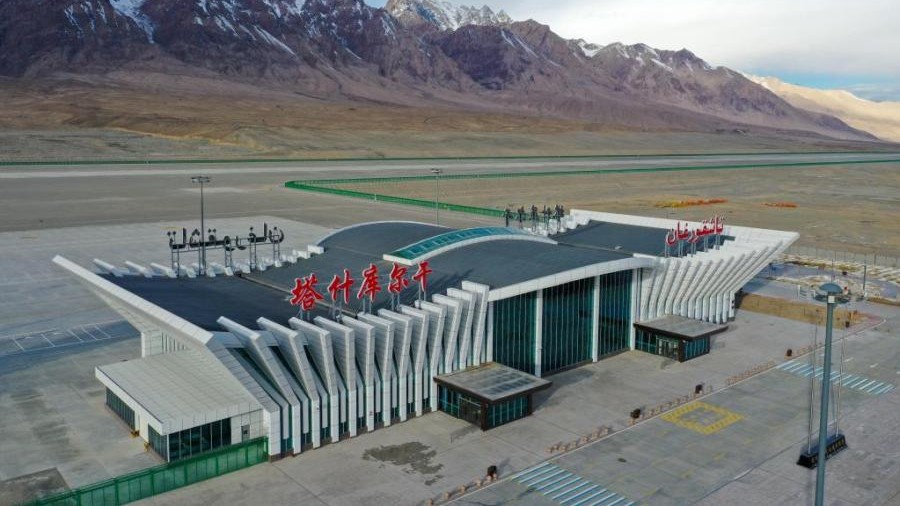


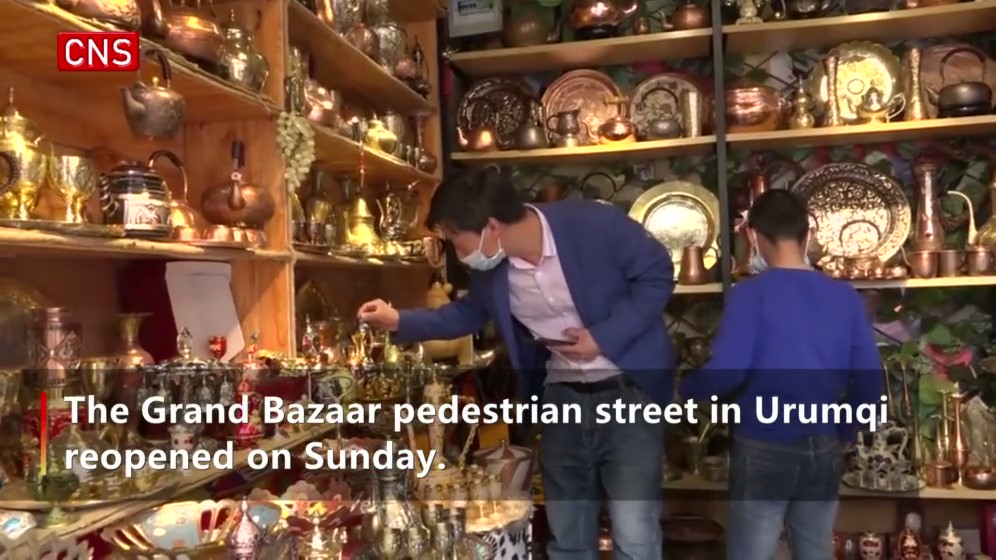

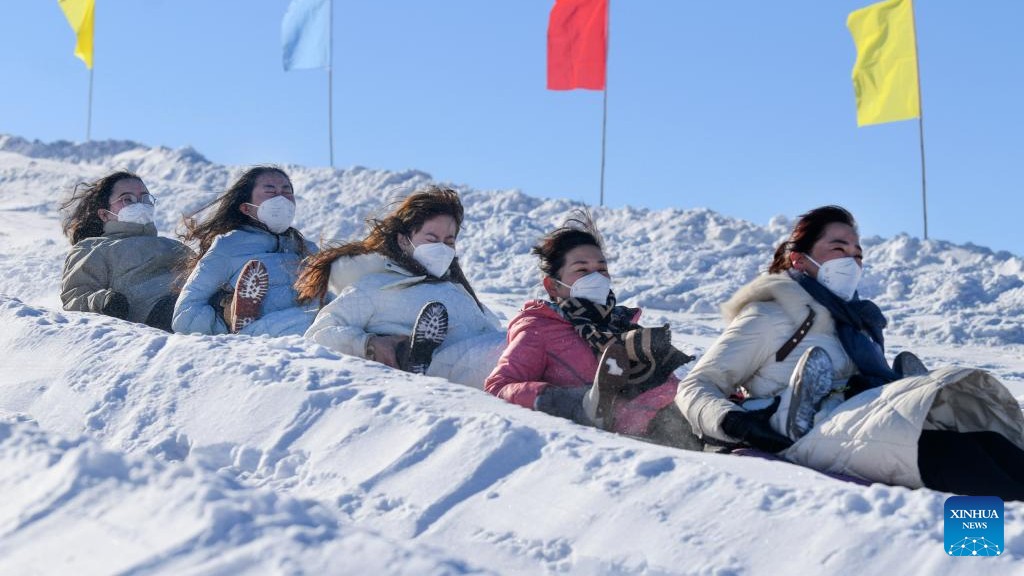


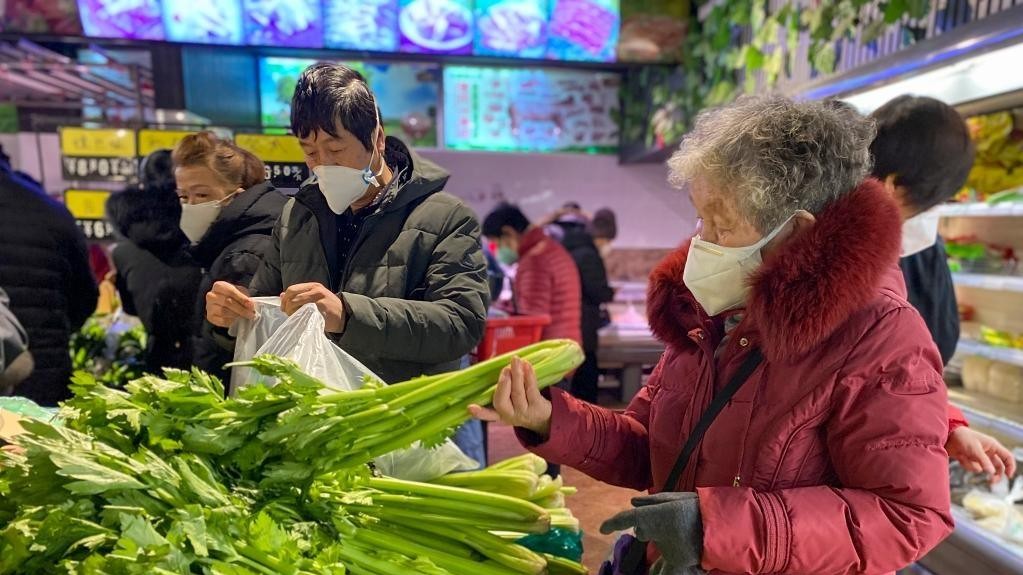

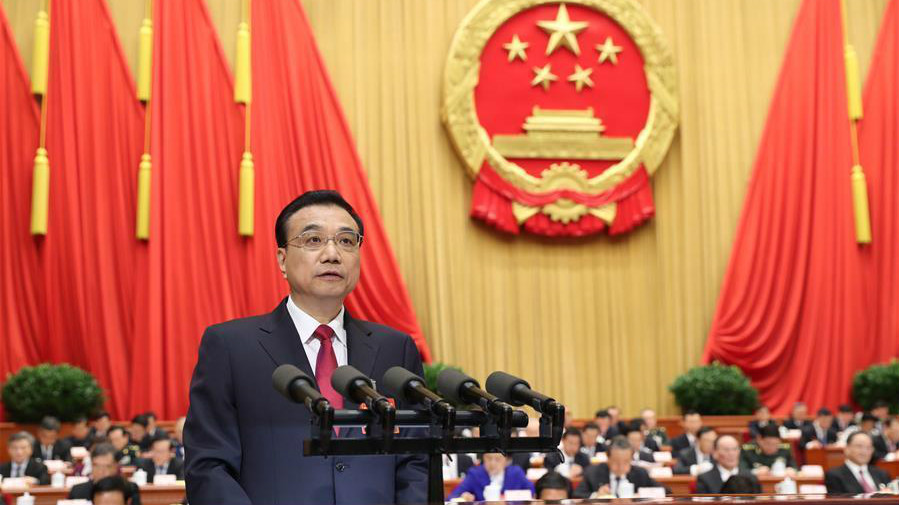
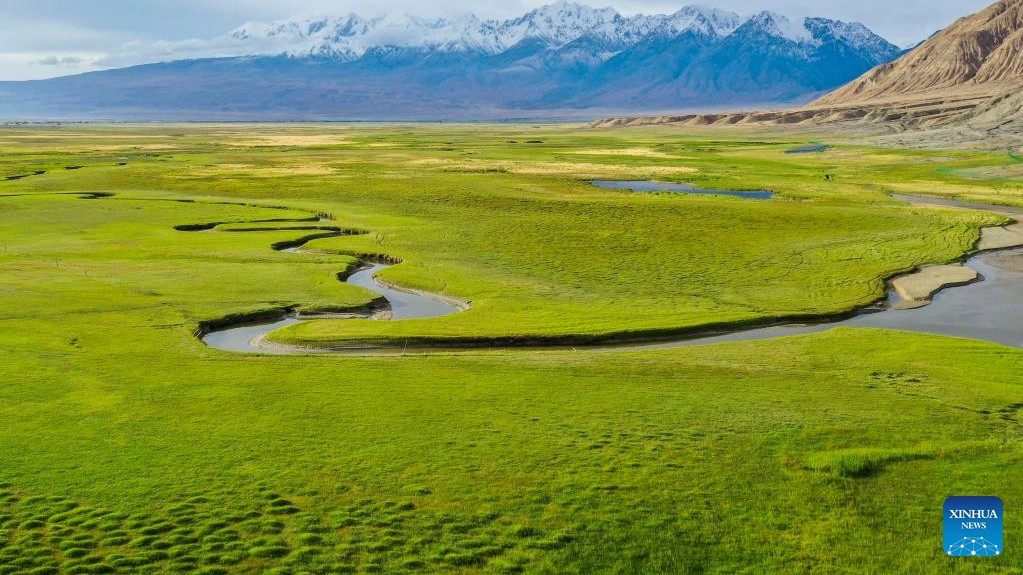
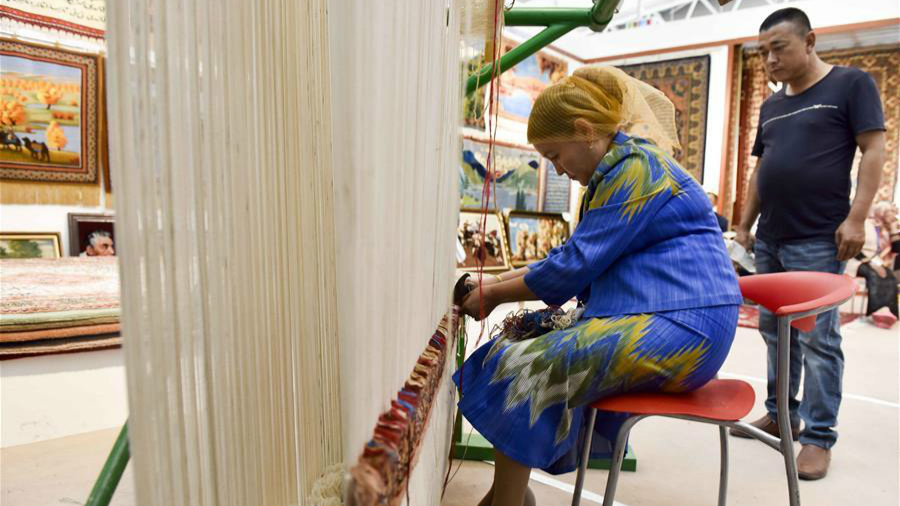
.jpg)

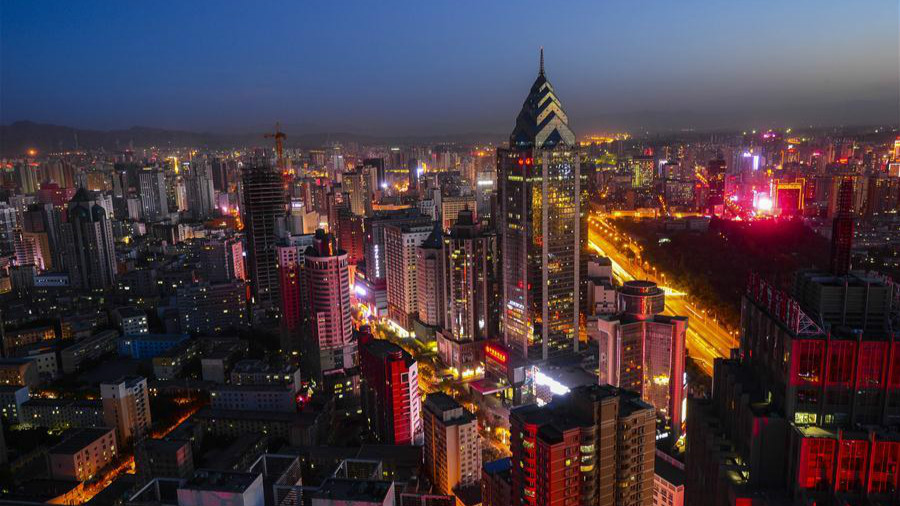
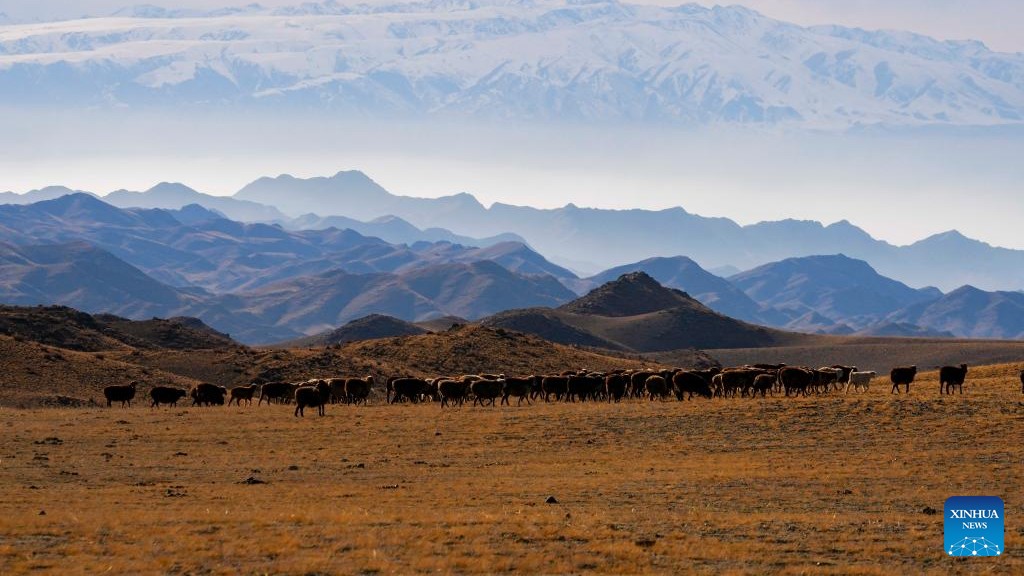

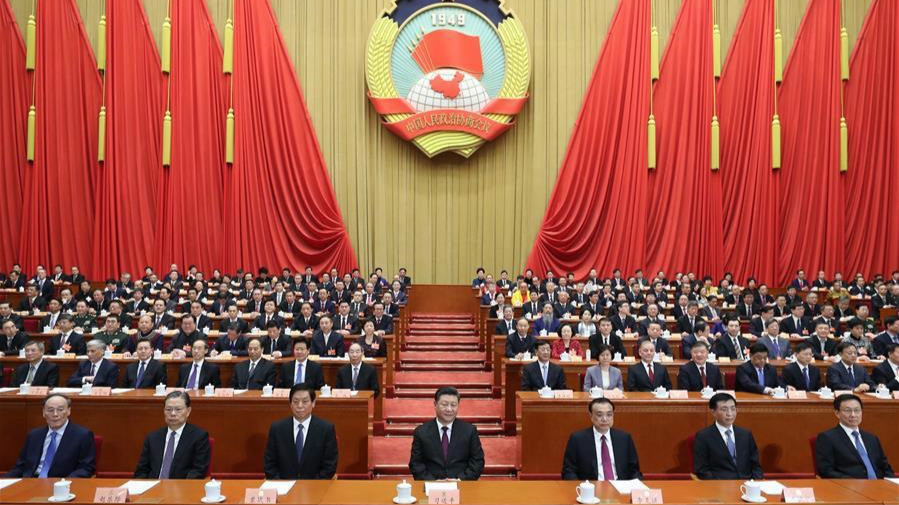
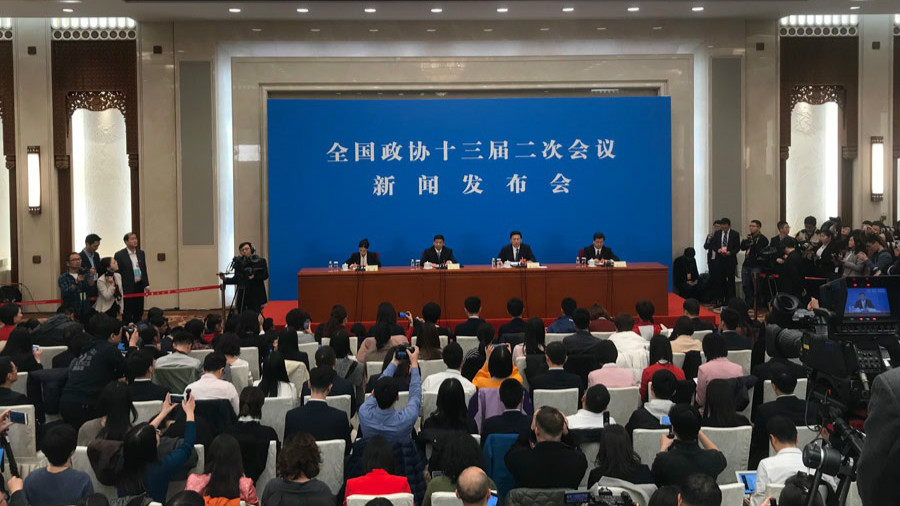
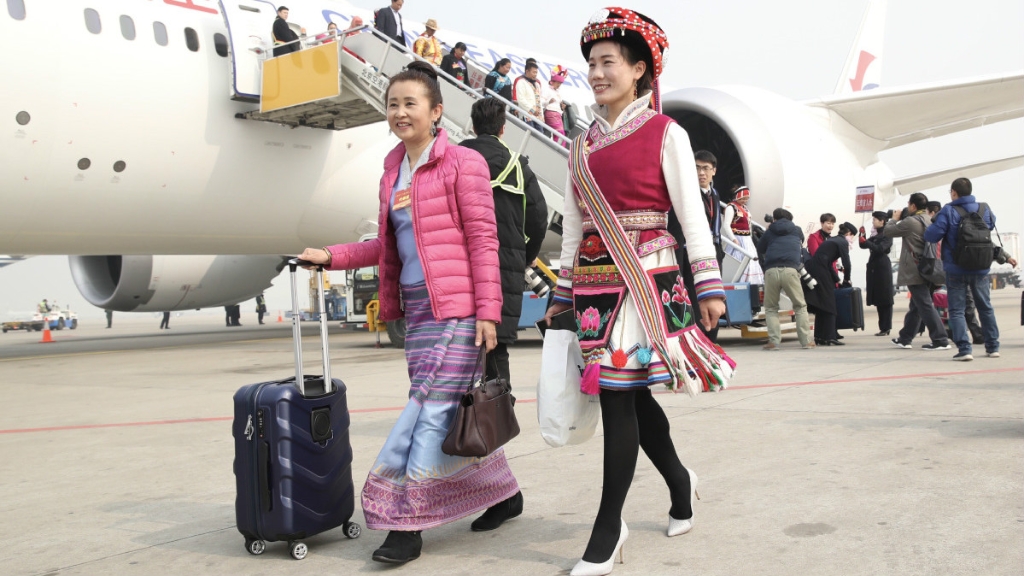
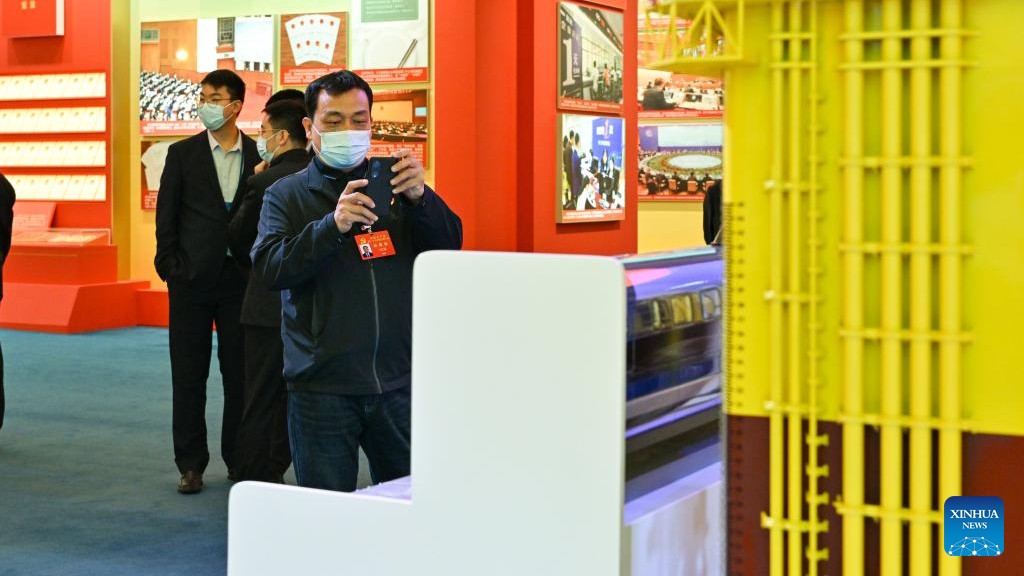
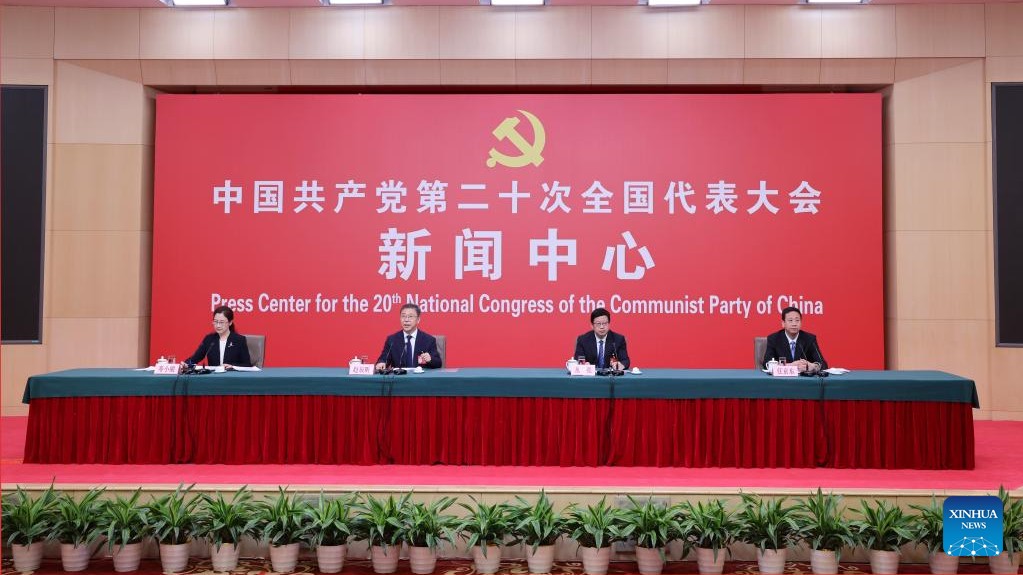
.jpg)
